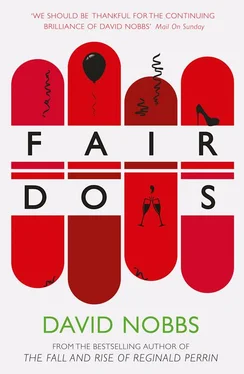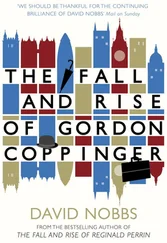Facing the massed ranks of Gerry’s friends and relations were the somewhat less massed ranks of Rita’s friends and relations, spiky aunts, uncouth uncles, spotty cousins, several of them not in morning dress. Less than two years ago, when she had been Liz Rodenhurst, Liz Badger had sat opposite them, and had tried to ignore them. She felt strange now, sitting among them, though still trying to ignore them.
Three rows behind her sat Rodney and Betty Sillitoe.
‘She’s late,’ whispered Betty, who was over-dressed as usual.
‘She’s exercising her prerogative,’ whispered Rodney.
‘You make it sound like a breed of dog,’ whispered Betty.
They shared a whispered laugh.
Ted Simcock, former provider of quality boot scrapers, now head waiter at Chez Albert in Bridge Street, looked round at exactly the same moment as Liz. They looked at each other with horror. At that other wedding eighteen months ago their exchanged glances had led to events which had broken up and reordered their world. Neville Badger, beside Liz, smiled blandly at Ted. Ted and Liz shied away hastily from the possibility that history might repeat itself. Ted craned his head to examine the great hammer roof. This was generally regarded as a magnificent example of early church architecture and a triumph for modern woodworm techniques, but Ted had no eyes for the vast pale beams, the carved angels, the faded red and gilt of the medieval paintwork. His head swivelled on, down again, towards the back of the church, where he met the gaze of the gleaming yellow lady. He looked away, she looked away, then they both looked back to see if they really had been giving each other meaningful looks. She smiled. He tried a smile that would make him look like a cool international sophisticate. It was a failure. He looked like a randy cocker spaniel.
The church clock proclaimed the quarter. Several people on Gerry’s side frowned. While a bride was expected to be late, a politician’s wife was expected to be punctual enough to be only slightly late.
Leslie Horton, water-bailiff and organist, who hated to be called Les, thundered through his limited repertoire without subtlety.
The best man, a drainage engineer from Dundee, who had been Gerry’s best friend at school, though more perhaps in retrospect than at the time, glanced at his watch and sighed.
Gerry smiled serenely at the new young vicar, who had not yet won the hearts of his congregation.
The long-haired Carol Fordingbridge was the first to mouth the possibility that had begun to form in a hundred barely credulous minds.
‘Wouldn’t it be awful if she didn’t turn up?’ she whispered.
‘Carol! She wouldn’t,’ whispered her fiancé with less than his usual cynicism. ‘She couldn’t. That’d be … awful.’
‘I know,’ breathed the former Miss Cock-A-Doodle Chickens excitedly. ‘Awful.’
They considered the awesome prospect in awful silence.
‘It’d be rather wonderful, though, wouldn’t it?’ she whispered.
The moment Leslie Horton had dreaded arrived. He had exhausted his programme of suitable pieces. The buzz of speculation in the congregation was growing steadily louder. Hats bobbed in horrified excitement. The new young vicar looked at Leslie Horton and shrugged with his eyes. Leslie Horton sighed with his shoulders and returned to the beginning of his repertoire.
The huge ribbed radiators had to fight valiantly against the stony chill of the abbey, even on this unseasonal day. With no joyous emotion to warm them, the ladies began to shiver. One of Rita’s uncles had a sneezing fit.
The vicar advanced upon Gerry, who tried to smile confidently. His smile curled at the edges like a slice of tongue approaching its ‘sell-by’ date. The eyes of the congregation were upon them.
‘If she isn’t here soon,’ whispered the vicar, ‘I’ll have to truncate the ceremony.’
‘Truncate the ceremony?’ hissed Gerry Lansdown. ‘I don’t want a truncated ceremony. I haven’t paid a truncated licence fee.’
‘I don’t approve of divorcees marrying in church, even though I understand your fiancée was not the guilty party,’ whispered the vicar, who was still referred to by his congregation as ‘the new vicar’, as if he would have to prove himself before earning the dignity of a name. ‘My predecessor was less strict. I’ve inherited you as a fait accompli. I do not intend you to be a fait accompli worse than death.’ He laughed briefly, with more self-congratulation than humour. ‘I have another wedding later, the groom is a councillor, and I do not intend to have to delay an important wedding in my very first week here.’
Gerry Lansdown’s hackles rose. His back arched. He was an insulted cat, ready for battle. But the vicar had gone.
‘She’s not coming, Rodney,’ whispered Betty Sillitoe, over-excited as usual. ‘She’s jilted him. How awful!’
‘She may have had an accident,’ whispered Rodney.
‘No. I know it. I feel it.’ She sighed. ‘I don’t know whether to feel glad or sad.’
‘I never do these days,’ whispered Rodney. Affection softened his florid face as he added hurriedly, ‘Except about you.’
‘Aaaah,’ said Betty, so loudly that several heads craned to identify the source. They heard her, oblivious to them, saying, ‘I’d kiss you if we weren’t in church.’
In front of them, the ravishing Liz Badger whispered into the immaculate right ear of her husband, ‘Maybe Gerry isn’t getting married after all. Maybe you’ll still have cause to feel jealous.’
‘Liz!’ Neville’s protest was too heartfelt to be contained in a whisper. ‘I respect you far too much to feel that I need ever feel jealous.’
‘Oh, Neville,’ whispered Liz. ‘You’re hopeless.’
The clock struck the half hour.
‘Five more minutes,’ whispered the vicar.
Gerry’s lips twitched. ‘Your precious councillor will have to wait, vicar,’ he hissed. ‘I think you should know that I just happen to be the prospective Social Liberal Democratic parliamentary candidate for Hindhead.’
The vicar smiled thinly. ‘He’s a serving councillor, not prospective. And he’s chairman of the Tower Appeal Fund Committee. Five minutes.’
The hum of conversation grew louder still. Leslie Horton’s playing grew slower. The sun lit up the garish battle scenes in the modern stained-glass window, dedicated to the King’s Own Yorkshire Light Infantry.
Ted’s eyes were drawn to Liz’s again and he realised that he was smiling. Hurriedly he tried to look horrified.
The new young vicar made a signal to Gerry.
Gerry nodded resignedly. A crescent of blue, reflected from a stained-glass window, was falling across his face.
‘Ladies and gentlemen,’ said the vicar. ‘It looks as if something has happened. I’m afraid we have no alternative, for the moment, as we have further nuptials pending on a tight schedule at this ever-popular venue, but to respectfully suspend the wedding for the moment. Mr Horton, would you please play us out?’
Leslie Horton, water-bailiff and organist, who hated to be called Les, would wonder to the end of his days why he played ‘The Wedding March ’ at that moment.
The vicar raised his eyes to heaven, but received no immediate help.
In the town the traffic moved slowly. A police horse, en route to football duty, crapped hugely outside the Abbey National Building Society. Four overweight railway enthusiasts, sitting on the top deck of a bright yellow corporation bus, with engine numbers in their notebooks and no rings on their fingers, peered at the hats and morning dresses without envy, so far removed from any of their remaining hopes was the glittering scene. A six-year-old girl with an empty water pistol said, ‘There’s no bride. Mam, there’s no bride.’
Читать дальше












